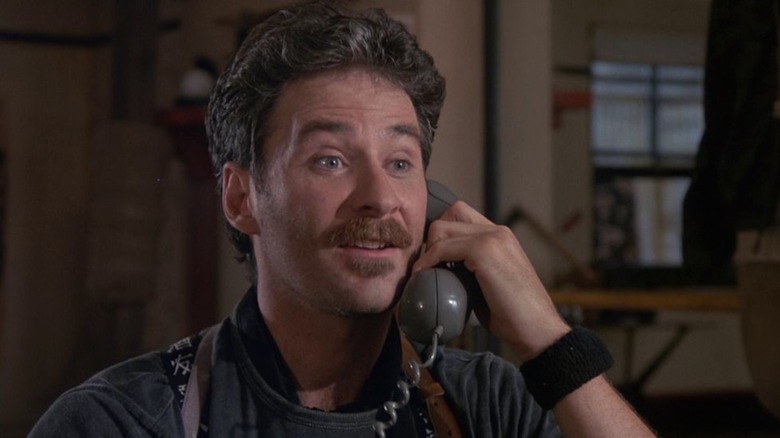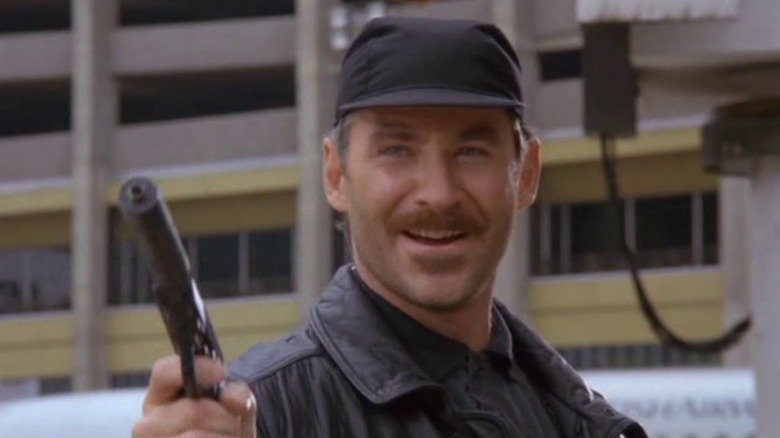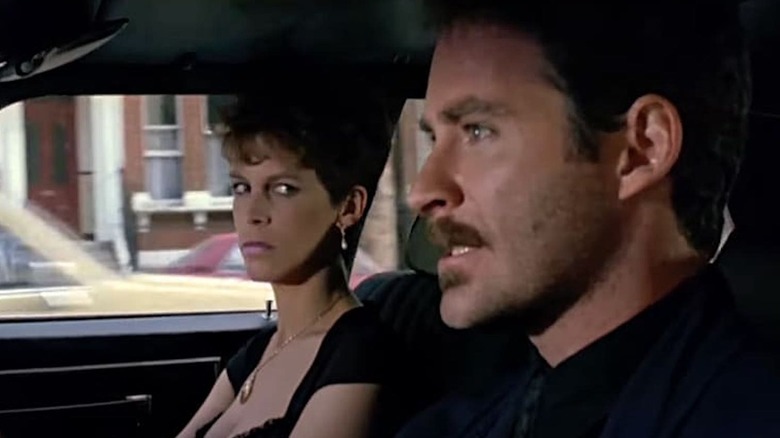Kevin Kline Never Understood His Character In A Fish Called Wanda
The character of Otto West in "A Fish Called Wanda" is a marvelous comedic creation. He is, in no particular order, a demolitions expert, a narcissist, a pervert, a psychopath and a moron. Otto does not, of course, believe he is a moron, and his deep conceitedness shields him from this truth — even though he has been called "stupid" enough times to specifically insist that people must not fling this epithet at his person.
There is a broad theatricality to Otto's idiocy, but he must be desirable enough to convince us that a wily con artist like Wanda Gershwitz (Jamie Lee Curtis) would go to bed with him repeatedly. There were dozens of character actors thriving in 1988 who could've met both prerequisites, but the role screamed for a movie star willing to make a spectacular ass out of himself. So thank god for Kevin Kline, even if he never believed he was nailing the part while he was giving one of the most delectably silly performances in screen history.
Kline goes bananas
Kline had won two Tonys by the time he made his film debut in 1982 as the enigmatic Nathan Landau in Alan J. Pakula's "Sophie's Choice." He quickly established himself thereafter as a warm-and-cozy leading man in "The Big Chill," "Silverado" and "Cry Freedom." He came off as the ideal suburban dad, a decent goofball, a loose-limbed Atticus Finch.
For those unfamiliar with Kline's Broadway performances, his hard left into the zaniness in "A Fish Called Wanda" came as something of a surprise. Otto is a maniac from frame one. He is blissfully unrelatable. This was not the Kevin Kline with whom moviegoers had fallen fast in love.
Kline more than possessed the capability to play a lunatic like Otto, but he wasn't sure he was pulling it off in the moment. As John Cleese, the film's star who'd also written its screenplay, said in an oral history for Vanity Fair:
"Kevin was doing some extraordinary things. But at the end of every take, he'd always stand there, the epitome of indecision, trying to figure out whether he'd got the character right. I don't think he ever did a take he was really happy with. There was always sort of a querulous, doubtful expression on his face. He would stand there agonizing. And you just got used to it after a time."
A fool beyond comprehension
Kline concurred, but he also discovered, still relatively early in his film career, that uncertainty wasn't the worst place from which to work as an actor:
"I kept saying, 'Who is this guy?' John actually had a T-shirt printed that said, 'Who is this guy?' Because he was such an amalgam of contradictions. He seemed to be a buffoon and idiot, but he's a good shot and he's got some physical strength. But I learned something from it: that, actually, not understanding the character is sort of all right. I realized it was a tribute to John's writing. Because well-written characters are inconsistent, are contradictory, and trying to reconcile the contradictions is maybe a fool's errand at the end of the day."
Accepting the inconsistent foolishness of Otto worked out quite well for Kline. He won the Academy Award for Best Supporting Actor Oscar in 1988, a rare victory for a comedic performance. Interestingly, I think he won the award not for his explosive displays of stupidity, but for the moment where Wanda explains in cringingly uproarious detail just how remarkably stupid he is (for the record, Otto evidently believes Plato was Belgian, Buddhism extols the virtue of "every man for himself," and the London Underground is some kind of revolutionary political movement).
He responds like a scolded child, and apologizes through clenched teeth. But Curtis plays to his vanity. This is what Plato would've done. Otto believes he's scored a victory. He's lived to scheme another day. Indeed, his abject cruelty nearly gets him to the finish line, but he is ultimately done in by the kindest soul in the movie. This is just one more reason why "A Fish Called Wanda" is one of the most skillfully crafted comedies you'll ever see.


